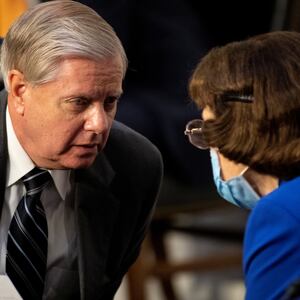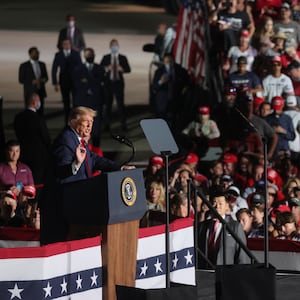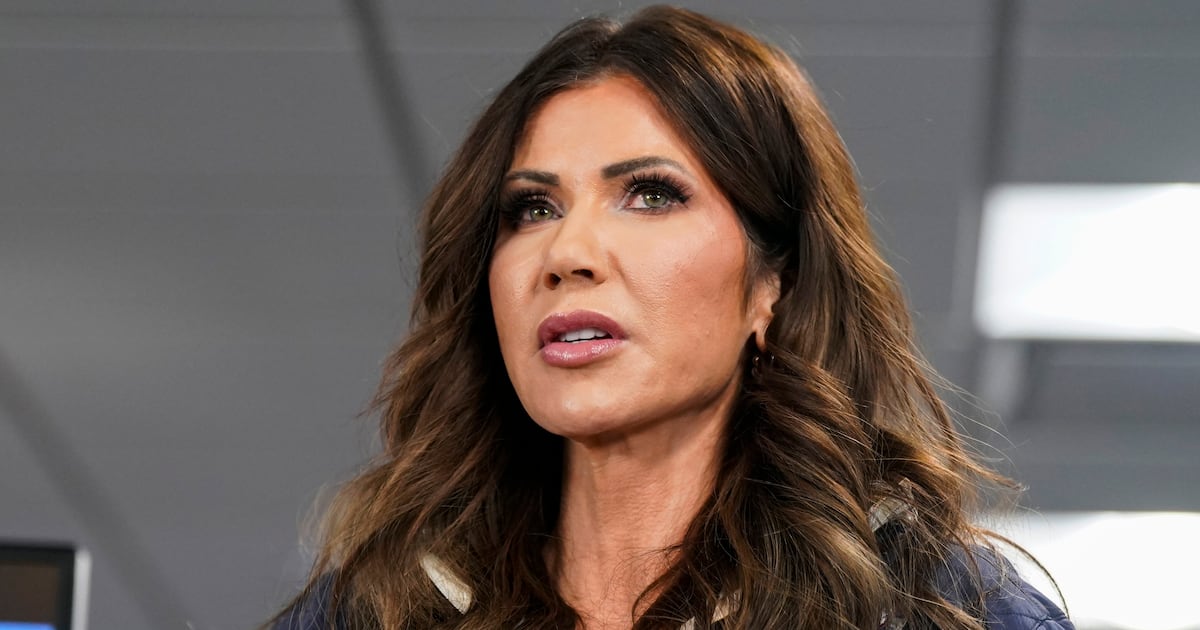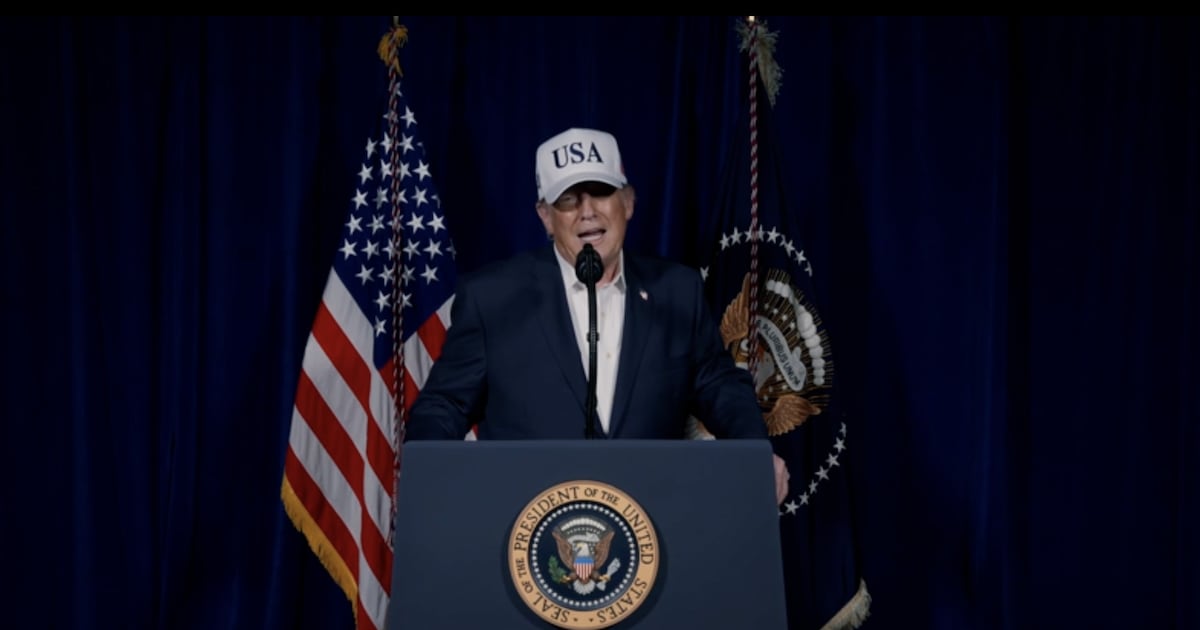Beset by controversy and lagging in the polls, President Donald Trump this week was handed what his allies described as a gift: an opportunity to recede from the national spotlight while his party scored a win that would rearrange the tectonic plates of government.
Trump promptly squandered the opportunity.
For weeks, operatives from both political parties have picked up on a defining phenomenon of the presidential race: The more that President Trump has been the center of conversation the worse it has been for him. The pattern held true through the summer and into the fall, and it has contributed to the president’s deficit to former Vice President Joe Biden in the election’s closing weeks.
All of which had sparked a bit of hope among some of the president’s allies, who believed that the confirmation hearings for Judge Amy Coney Barrett would give them the type of reprieve they needed: the rare case of someone other than Trump becoming the focus of national attention; and, with it, a conversation on something other than the rising coronavirus death toll, a flagging U.S. economy, and continued racial unrest in American cities.
“A1 all week is gonna be the Supreme Court,” a source close to the Trump campaign predicted on Monday morning. “Someone else being the main story in the news, particularly someone who reminds soft Republicans and independents what they do like about Trump's policies, is a good thing for him, particularly right now.”
But by the end of the day, Trump had made his play for above-the-fold placement on the morning’s papers. His campaign was publicly feuding with Dr. Anthony Fauci, one of the nation’s most prominent voices on the coronavirus fight, who also admitted on Monday that he was opposed to the kind of rallies that Trump is still holding. And after the president took the stage at his Sanford, Florida, rally on Monday evening around 7 p.m. ET, he started cracking jokes about how seriously he was taking the situation as he’s been recovering from the virus.
"I'll kiss every one in that audience,” Trump said. “I'll kiss all the guys and the beautiful women.”
Near the start of the evening’s event, which marked his return to the trail, Trump tried his best to hit the preferred themes of the evening, talking a bit about his latest Supreme Court nominee, who seems poised to be confirmed before the election. But then, he quickly pivoted back to his preferred topic of conversation; mainly, him.
"I'm very young,” Trump joked, riffing on his COVID-19 recovery as an elderly man. “I'm in great shape."
He soon moved on to once again calling for an aggressive reopening of the country’s economy, to “get our country rolling” amidst the still raging pandemic. He accused Democrats of allowing immigrants to spill over the nation’s borders, even those who are “rapists” or who could be carrying diseases that they could give to Americans, apparently glossing over the irony that he himself helped turn his White House into a COVID hot zone. He claimed that if Biden were to beat him in November, “there will be bedlam all over the place.”
“He’s not going to win,” Trump assured the audience at one point. “I got him.”
For GOP onlookers, it was highly expected—the equivalent of an aging rockstar playing the hits to his adoring fans when he really should be trying to promote his newer work.
“Any time he is not on the front page, at this point, is helpful,” said Alex Conant, a veteran Republican strategist who ran communications for Sen. Marco Rubio’s (R-FL) 2016 presidential campaign. Trump, Conant said, “needs this election to be about something other than his own tweets and handling of COVID. Every time he steps on to the White House porch, the story is about him ignoring what his doctor has told him.”
As the aforementioned source close to the Trump campaign noted, the “president is no shrinking violet.” And few, if any, in his orbit expect him to be able to play second fiddle to anyone else competing for the news cycle. But heading into this week, there had been hope, expressed to The Daily Beast by multiple prominent Republicans and administration officials earlier in the day, that Trump would take a backseat to the third Justice he had nominated to the high Court.
Bryan Lanza, a top communications aide on the president’s 2016 campaign, told The Daily Beast on Monday afternoon that Barrett’s confirmation hearings would quickly dominate national attention. But asked whether he thought the president could resist jumping back into the fray, Lanza said, “No, absolutely not...He’s the president, it all revolves around him anyway.”
If anyone on Trump’s campaign saw strategic value in keeping a low profile amid the Barrett confirmation hearings, they certainly didn’t show it publicly. Jason Miller, a top campaign communications hand, said in a Monday call with reporters that the president was “getting on my case for not having enough rallies” and “eager” to get back on the trail.
By Monday evening the campaign was hyping up Trump’s first rally since his coronavirus diagnosis—and using it to try to squeeze some money out of the president’s supporters. Trump, himself, seemed rejuvenated by his return to the trail, speaking in a rushed, energetic manner that gave the impression of a candidate trying to make up for lost time.
It was, for a moment, enough to overshadow the confirmation hearings that morning. And while Coney Barrett will have the spotlight on her again when the Senate Judiciary Committee meets once more on Tuesday, Trump’s political opponents were not exactly displeased with how the day went.
“With each appearance Donald Trump is providing an avalanche of reminders for why his presidency has been a train wreck for families: he has ramped up attacks on science, he keeps proudly attempting to tear the American people apart for perceived political gain, and he still has no intention of taking the pandemic seriously -- even after 8 devastating months and contracting the virus himself,” said Biden spokesman Andrew Bates.










